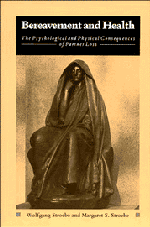Book contents
- Frontmatter
- Contents
- Preface
- 1 Introduction
- 2 The symptomatology of grief
- 3 Is grief universal? Cultural variations in the emotional reactions to loss
- 4 Depression models of grief
- 5 Stress models of grief
- 6 Mediators between stress and illness
- 7 The loss effect: health consequences of marital bereavement
- 8 Risk factors in bereavement outcome
- 9 Reducing the risk of poor bereavement outcome
- References
- Author index
- Subject index
7 - The loss effect: health consequences of marital bereavement
Published online by Cambridge University Press: 03 May 2010
- Frontmatter
- Contents
- Preface
- 1 Introduction
- 2 The symptomatology of grief
- 3 Is grief universal? Cultural variations in the emotional reactions to loss
- 4 Depression models of grief
- 5 Stress models of grief
- 6 Mediators between stress and illness
- 7 The loss effect: health consequences of marital bereavement
- 8 Risk factors in bereavement outcome
- 9 Reducing the risk of poor bereavement outcome
- References
- Author index
- Subject index
Summary
Grief over the death of a spouse is an immensely painful experience. Those who suffer show psychological and physical symptoms which for some considerable period of time are very similar to those of clinical depression. It is comforting to know, however, that after twelve to eighteen months most bereaved begin to recover and ultimately show little sign of psychological or physical damage. Though they may still miss their partners intensely at times, having worked through their grief, they will be ready and able to cope with the demands of everyday life. And yet, the age-old belief that grief can have lethal consequences is more than a myth. As we will show in this chapter, there is a great deal of evidence which links widowhood to an increase in clinical depression, mental illness, physical illness, and mortality from natural as well as unnatural causes such as suicide. This negative impact of bereavement on health has been called the loss effect (W. Stroebe et al., 1982). But before we discuss these findings, a brief overview of the methodology used in this area will be provided since, as we will show, an accurate assessment of the extent of health risk has frequently been obscured by a failure to follow methodologically stringent procedures.
Methodological issues in bereavement research
The choice of data base: large-scale survey versus in-depth interview
Investigations of the impact of bereavement on mental and physical health fall fairly clearly into two categories, large-scale epidemiological surveys of representative and often nationwide samples, and studies in which in-depth interviews are conducted with small and nonrepresentative samples of bereaved and nonbereaved subjects.
- Type
- Chapter
- Information
- Bereavement and HealthThe Psychological and Physical Consequences of Partner Loss, pp. 121 - 167Publisher: Cambridge University PressPrint publication year: 1987



